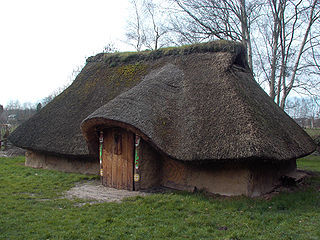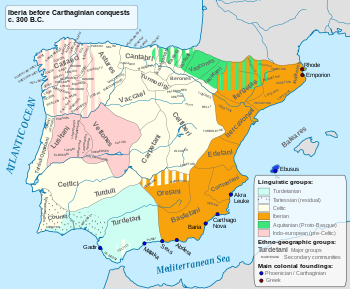
The Menapii were a Belgic tribe dwelling near the North Sea, around present-day Cassel, during the Iron Age and the Roman period.

The Astures or Asturs, also named Astyrs, were the Hispano-Celtic inhabitants of the northwest area of Hispania that now comprises almost the entire modern autonomous community of the Principality of Asturias, the modern province of León, and the northern part of the modern province of Zamora, and eastern Trás os Montes in Portugal. They were a horse-riding highland cattle-raising people who lived in circular huts of stone drywall construction. The Albiones were a major tribe from western Asturias. Isidore of Seville gave an etymology as coming from a river Astura, identified by David Magie as the Órbigo River in the plain of León, and by others as the modern Esla River.

The Turduli or Turtuli were an ancient pre-Roman people of the southwestern Iberian Peninsula.

The Turduli Veteres, translated as "Ancient Turduli" or "Old Turduli" were an ancient pre-Roman tribe of present day Portugal, akin to the Calaicians or Gallaeci and Lusitanians.

The Cantabri or Ancient Cantabrians were a pre-Roman people and large tribal federation that lived in the northern coastal region of ancient Iberia in the second half of the first millennium BC. These peoples and their territories were incorporated into the Roman Province of Hispania Tarraconensis in 19 BC, following the Cantabrian Wars.

The Vaccaei or Vaccei were a pre-Roman Celtic people of Spain, who inhabited the sedimentary plains of the central Duero valley, in the Meseta Central of northern Hispania.

The Gallaeci were a Celtic tribal complex who inhabited Gallaecia, the north-western corner of Iberia, a region roughly corresponding to what is now the Norte Region in northern Portugal, and the Spanish regions of Galicia, western Asturias and western León before and during the Roman period. They spoke a Q-Celtic language related to Northeastern Hispano-Celtic, called Gallaecian or Northwestern Hispano-Celtic. The region was annexed by the Romans in the time of Caesar Augustus during the Cantabrian Wars, a war which initiated the assimilation of the Gallaeci into Latin culture.

The Oretani or Oretanii were a pre-Roman ancient Iberian people of the Iberian Peninsula, that lived in northeastern Andalusia, in the upper Baetis (Guadalquivir) river valley, eastern Marianus Mons, and the southern area of present-day La Mancha.

The Lusones were an ancient Celtiberian (Pre-Roman) people of the Iberian Peninsula, who lived in the high Tajuña River valley, northeast of Guadalajara. They were eliminated by the Romans as a significant threat in the end of the 2nd century BC.

The Varduli were a pre-Roman tribe settled in the north of the Iberian Peninsula, in what today is the western region of the Basque Country.

The Autrigones were a pre-Roman tribe that settled in the north of the Iberian Peninsula, in what today is the western Basque Country and northern Burgos and the East of Cantabria, Spain. Their territory limited with the Cantabri territory at west, the Caristii at east, the Berones at the southeast and the Turmodigi at the south. It is discussed whether the Autrigones were Celts, theory supported by the existence of toponyms of Celtic origin, such as Uxama Barca and other with -briga endings and that eventually underwent a Basquisation along with other neighboring tribes such as the Caristii and Varduli.

The Arevaci or Aravaci, were a Celtic people who settled in the central Meseta of northern Hispania and dominated most of Celtiberia from the 4th to late 2nd centuries BC. The Vaccaei were their allies.

The Olcades were an ancient stock-raising pre-Roman people from Hispania, who lived to the west of the Turboletae in the southeastern fringe of the Iberian system mountains.

The Turmodigi were a pre-Roman ancient people, later mixed with the Celts people of northern Spain who occupied the area within the Arlanzón and Arlanza river valleys in the 2nd Iron Age.

The Berones were a pre-Roman Celtic people of ancient Spain, although they were not part of the Celtiberians. They lived north of the latter and close to the Cantabrian Conisci in the middle Ebro region between the Tirón and Alhama rivers.

The Titii or Tithii were a small and obscure Celtiberian people, whose lands were located along the middle Jalón and upper Tajuña valleys, somewhere between Alhama de Aragón in Zaragoza and Molina de Aragón in Guadalajara provinces.

The Pellendones, also designated Pelendones Celtiberorum and Cerindones, were an ancient pre-Roman Celtic people living on the Iberian Peninsula. From the early 4th century BC they inhabited the region near the source of the river Duero in what today is north-central Spain, an area comprising the north of Soria, the southeast of Burgos and the southwest of La Rioja provinces.

The Uraci or Duraci were a little-known Celtic people of pre-Roman Iberia who dwelt to the east of the Vaccaei and the Carpetani, occupying the southern Soria, northern Guadalajara and western Zaragoza provinces since the 4th century BC.

The Plentauri or Pleutauri was a small, pre-Roman mountain people of the Iberian Peninsula mentioned briefly by Strabo who placed them in the Ebro sources area close to the Cantabrian range, roughly corresponding today to northwestern La Rioja.
This section of the timeline of Iberian history concerns events from before the Carthaginian conquests.





